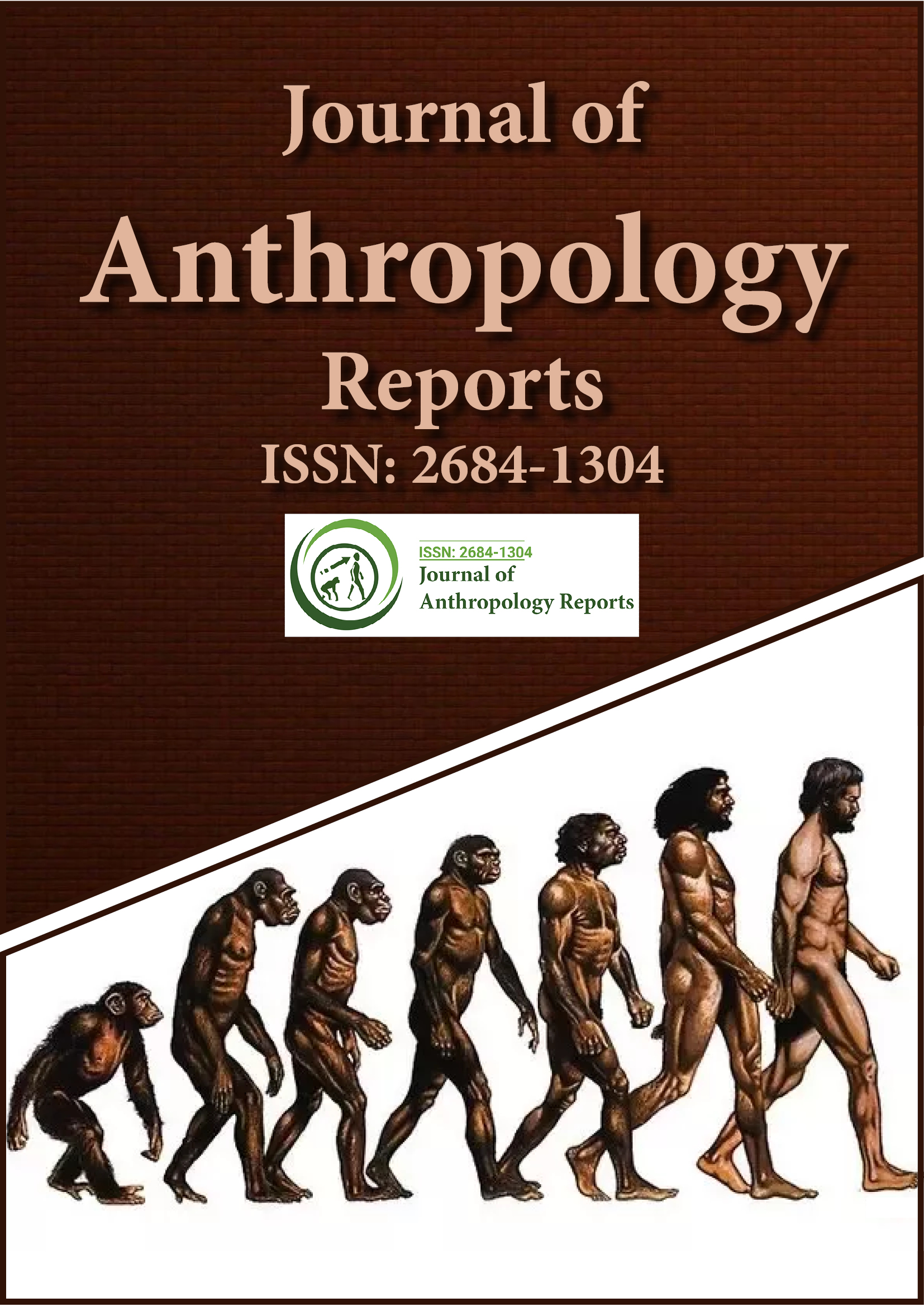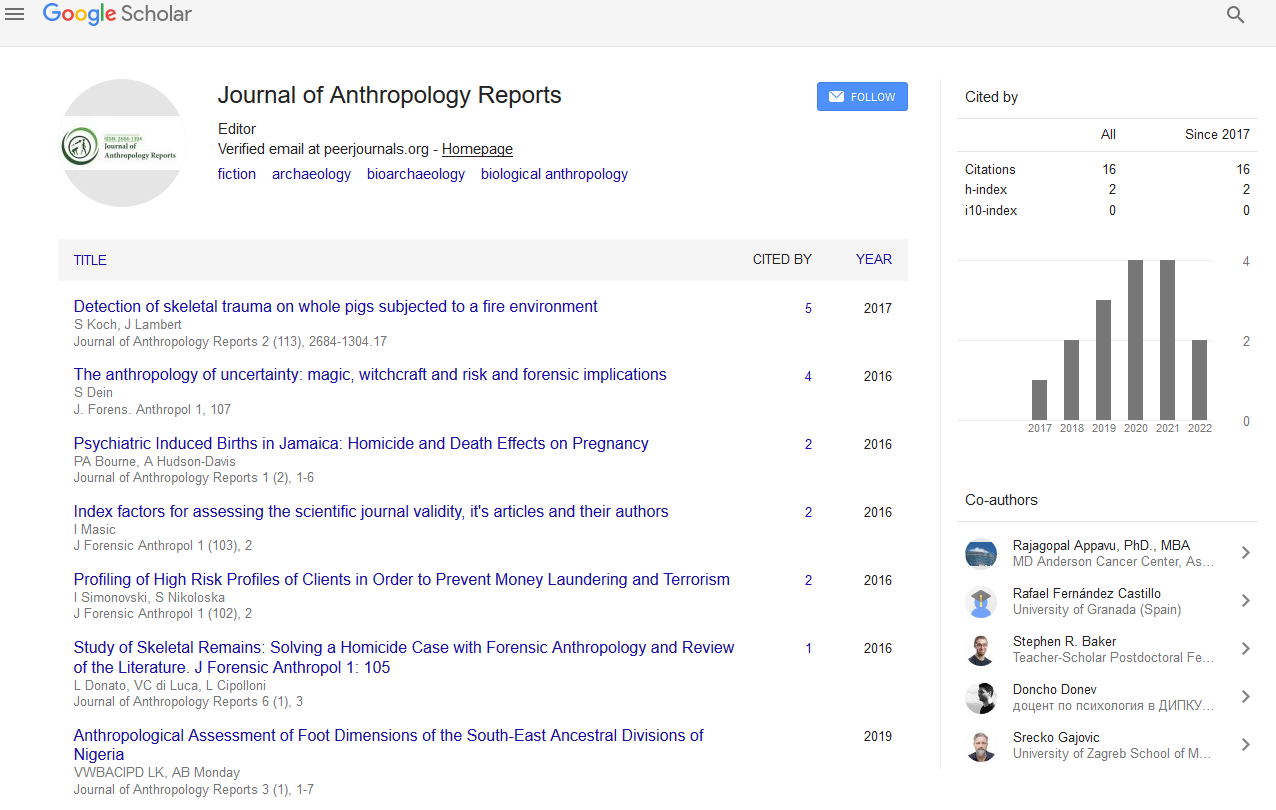Indexed In
- RefSeek
- Hamdard University
- EBSCO A-Z
Useful Links
Share This Page
Journal Flyer

Open Access Journals
- Agri and Aquaculture
- Biochemistry
- Bioinformatics & Systems Biology
- Business & Management
- Chemistry
- Clinical Sciences
- Engineering
- Food & Nutrition
- General Science
- Genetics & Molecular Biology
- Immunology & Microbiology
- Medical Sciences
- Neuroscience & Psychology
- Nursing & Health Care
- Pharmaceutical Sciences
Commentary Article - (2022) Volume 5, Issue 3
An Anthropological Investigation of Ethnomedicinal Uses
Victoria Gibbon*Received: 03-May-2022, Manuscript No. JFA-22-17029; Editor assigned: 05-May-2022, Pre QC No. JFA-22-17029(PQ); Reviewed: 19-May-2022, QC No. JFA-22-17029; Revised: 27-May-2022, Manuscript No. JFA-22-17029(R); Published: 07-Jun-2022, DOI: 10.35248/2684-1304-22.5.129.
About the Study
Anthropologists in their study of different cultures of the world have also studied the health problems under broad headings of ethno medicine. The term ‘Ethnomedicine’ comprises of two words where ‘Ethnos’ has Greek origin which means group or a community of people or population and ‘Medicine’ derives its origin from Latin ‘Medicus’ which stands for a physician; in this way traditional use of medicines bio-social by a community is called traditional medicine Ethnomedicine [1].
Ethno medical system deals with causes and prevention of illness diagnosis and treatment such as ethnophysiology, ethno psychiatry, practitioner seeking behavior, and ethnopharmacology covered under ethnomedical research. It has evolved historically, mixing biological and cultural facts with their perspectives. Anthropology, on the one hand, connects with the natural sciences and life sciences, and on the other hand, with common boundaries with the social sciences and the humanities.
The traditional or core disciplines of anthropology have evolved into separate disciplines such as, Bio Sociocultural, physical, archaeological and linguistic sciences. Applied and Behavioral Anthropology, Ecological and Medical Anthropology are very important and useful sub-branches of anthropology [2]. Various disciplines of anthropology and human science are summarized as ethno science, merging with other scientific disciplines such as ethnobotany, ethnozoology, ethnopharmacology, ethnophysiology, and ethno math.
Medical Anthropology as a sub branch extensively deals with the management of health and provides information on the concept of health, hygiene, cure and medicine [3]. Three subfields of Anthropology which are of direct relevance to health management include Medical Anthropology, Ecological Anthropology and Ethno medicine.
Ethnomedicine examines and translates health-related knowledge and theories that people inherit and learn by living in a culture. Each society has a particular medical culture or “Ethnomedicine’’. The term Ethnomedicine may be described as the study of beliefs and practices relating to illness as well as hygienic, preventive and curing practices in the different ethnic populations. It includes the study of the cultural concept of the health, diseases and illness, as well as the nature of local healing system. Therefore, it is not merely a topic of concern in Ethnobotany, medical science, or Cultural Anthropology, but a multidisciplinary perspective that includes Anthropology, Botany, Zoology, Chemistry, Pharmacology, Toxicology, Medicine, History, or even Linguistics [4].
Ethnomedicine has been nourished by Anthropology on one hand and Botany on other. The main concern of the Anthropologists is to collect information about the traditional medical uses of plants or animal resources among simple or complex human societies and to provide new biological resources for the humankind [5]. Botanists and Zoologists contribute in identification of flora-fauna, determination of correct nomenclature and procurement and utilization of the medicinal flora and fauna. While the objectives of biologists are mainly utilitarian, the Anthropologist mainly concerned with narration of the influence and adaptations of plants and animals on human culture and societies.
Tribal medicine is in fact mother of all other traditional medicine systems. The term traditional though a recent coinage, the field of traditional medicine it not a new one and traces its origin since time immemorial, hence, creates confusion in many minds from lay men to professional. It is much desirable at the outset to explain clearly the meaning of the term and the logic behind the term to be called what it is today [6]. WHO says that traditional medicine is the sum total of the knowledge, skills, and practices based on the theories, beliefs, and experiences indigenous to different cultures, whether explicable or not, used in the maintenance of health as well as in the prevention, diagnosis, improvement or treatment of physical and mental illness [7]. W.H.O. has estimated that 80% of the people in the world believe in traditional medicine for primary health care needs. The traditional medicine is twin, centered on two traditional systems of medicine.
REFERENCES
- Muthusamy AP, Rajendran M, Ramesh K, Sivaprakash P. A review on road traffic accident and related factors. Int J Appl Eng Res. 2015;10(11):28177-28183.
- Elmrghni S, Kaddura M. Road Traffic Accident Deaths in Benghazi during. J Forensic Sci. 2011;4(1): 35-39.
- Asogwa SE. Road traffic accidents: a major public health problem in Nigeria. Public Health. 1978;92(5):237-245.
- Odero W, Garner P, Zwi A. Road traffic injuries in developing countries: a comprehensive review of epidemiological studies. Trop Med Int Health. 1997;2(5):445-460.
[CrossRef] [Google Scholar] [Pubmed]
- Ekere AU, Yellowe BE, Umune S. Mortality patterns in the accident and emergency department of an urban hospital in Nigeria. Niger J Clin Pract. 2005;8(1):14-18.
[CrossRef] [Google Scholar] [Pubmed]
- Labinjo M, Juillard C, Kobusingye OC, Hyder AA. The burden of road traffic injuries in Nigeria: results of a population-based survey. Inj Prev. 2009;15(3):157-162.
- Hussain T, Shu L, Sosorburan T, Adji AS, Khan AH, Raja AF. Road traffic accidents: an observational and analytical study exploring the hidden truths in Pakistan and South East Asian countries. Health line. 2011;2(1):52-57.
Citation: Gibbon V (2022) An Anthropological Investigation of Ethnomedicinal Uses. J Anthropology Rep. 5:129.
Copyright: © 2022 Gibbon V. This is an open access article distributed under the terms of the Creative Commons Attribution License, which permits unrestricted use, distribution, and reproduction in any medium, provided the original author and source are credited.

